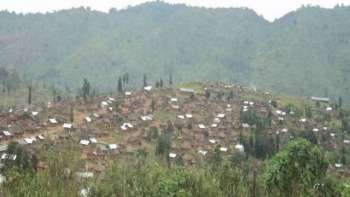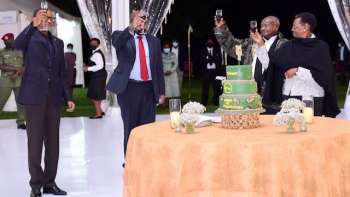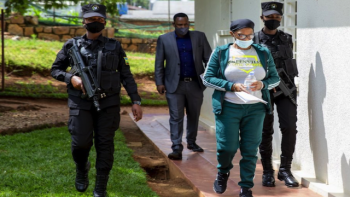After two years of hope following the overthrow of the last Sudanese bloody dictator Omar-al-Bashir, Sudan's military junta seized power in a coup on Monday, October 24, 2021. The military junta dissolved a transitional government that had been set up to manage the transition towards democracy. General Abdel Fattah al-Burhan, head of the Sovereign Council set up under the transition to share power among the military and civilians, led the coup.
The overthrown Prime Minister Abdalla Hamdok was detained and taken to an undisclosed location. According to information ministry, Abdalla Hamdok refused to support the coup and the coup leaders have arrested the civilian members of the government and of the Sovereign Council. "We raise our voices loudly to reject this coup attempt," the information ministry said.
Following the overthrow of Omar Hassan Ahmad al-Bashir in 2019, Abdalla Hamdok, an economist and former senior U.N. official, was appointed Prime Minister to lead the transition (see Africa: African Dictators of 2021; 3 Down, More to Go). However, he was faced with many challenges from the military leaders, the supporters of Omar-al-Bashir, rebel groups, and the worsening economy cisis. The political conflicts and divisions between the military and civilians were apparently the most challenging.
Many activists and non political organizations have resisted the takeover by the army. Youths opposed to the takeover have led demonstations, barricaded streets, clashed with the military and security forces.
General Abdel Fattah al-Burhan declared a state of emergency, claiming that the military took power to protect safety and security.
"We guarantee the armed forces' commitment to completing the democratic transition until we hand over to a civilian elected government... What the country is going through now is a real threat and danger to the dreams of the youth and the hopes of the nation." He extended the transition to July 2023.
Advertisement
... ON AMAZON AND BARNES NOBLE-- CLICK HERE
For more on Legs of Tornado: The Human Who Outran the Wind, Visit the site Legs of Of Tornado, here
A Militay Coup During Crises
The spiral of the country to the current political crisis was building up since the overthrow of Omar-al-Bashir, now wanted by the International Criminal Court in the Hague for war crimes and crimes against humanity.
Since then, supporters of Omar Hassan Ahmad al-Bashir plotted failed coups, military and civilians within the Sovereign Council and the governments have clashed and rebel groups and political parties aligned themselves with the military to push for the to dissolution of the civilian government, and the civilians within the government joined the protests by activists against the military rule.
Most international organisations, including the United Nations and the African Union and some World superpowers, including the USA, UK, and Fance have condemned the military takeover. Some African and Asian countries only issued mixed opinions.
What is Next: Hopes in the Actions by Activists and Women
Meanwhile, most wonders what these condamnations can achieve in a country where the brutal military junta has been holding the reign for decades, while the World was watching. The eyes are tuned to the same or similar people who led the overthrow of Omar Hassan Ahmad al-Bashir.
Sudan dictator Omar Hassan Ahmad al-Bashir was featured among AfroAmerica Network African ruthless dictators of 2018 (see AfroAmerica Network African Dictators Who Mattered In 2018: Congolese Joseph Kabila, Rwandan Paul Kagame, Ugandan Yoweri Museveni of Dec 27, 2018). Women played a major role in deposing Omar Hassan Ahmad al-Bashir, one of the most feared and entrenched African dictators. Hence, women and activists are expected to play a similar to resist the army.
One of these women is Alaa Salah, who, wearing a memorable white clothes,led effective protest chants against President Omar al-Bashir in front of the military headquarters in the capital Khartoum. She has been dubbed "Kandaka" or Nubian Queen.
©2021 AfroAmerica Network

















